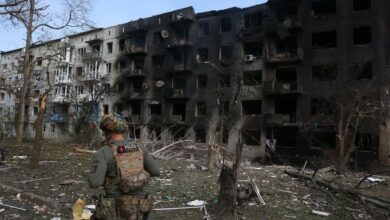Germany to pitch international control of Syria-Turkey border zone to NATO allies
Germany’s defense minister Annegret Kramp-Karrenbauer will present a proposal for an internationally controlled security zone on the Syria-Turkey border to NATO allies, media reported on Monday, October 21.
Kramp-Karrenbauer told DPA that she had coordinated with Chancellor Angela Merkel on Monday and proposed the new mission to Western allies. She will present the plan on the sidelines of the meeting of NATO defense ministers on Thursday and Friday.
Kramp-Karrenbauer said that Germany and other European states have so far been too passive in response to Turkey’s incursion into northeast Syria.
“The question of what this solution might look like lies in the creation of an internationally controlled security zone involving Turkey and Russia, with the aim of de-escalating the situation” and continuing the fight against Islamic State and the constitutional process set in motion by U.N. Security Council resolutions, Kramp-Karrenbauer said.
Germany’s parliament, the Bundestag, must approve foreign deployments of the Bundeswehr, Germany’s military.
The German government considers the Turkey-led incursion to be a violation of international law, but so far has only restricted some military exports to Turkey along with other states including Spain, Sweden the United Kingdom and Canada.
“We don’t believe that an attack on Kurdish units or Kurdish militia is legitimate under international law,” AFP reported Foreign Minister Heiko Maas as saying on Sunday. “If there is no basis in international law for such an invasion, then it can’t be in accordance with international law.”
NATO-member Turkey launched Operation Peace Spring on October 9 after U.S. President Donald Trump said he would withdraw the majority of U.S. troops from northeast Syria.
Turkey’s armed forces and Syrian rebel groups operating under the banner of the Syrian National Army aim to push the Syrian Democratic Forces and its predominantly-Kurdish People’s Protection Units (YPG) south in order to occupy a 30-km-wide buffer zone along the border.
Backed by the U.S.-led Coalition, the SDF fought the ground war against ISIS in north and east Syria. Turkey considers the YPG, the backbone of the multi-ethnic SDF, to be a terrorist organization inextricably linked to the Kurdistan Workers Party (PKK), which has waged a decades-long insurgency in Turkey.
The offensive has so far focused on the 120-km (75 mile) area between Ras al-Ayn, also called Serekaniye, and Tal Abyad, part of a stretch of Syrian territory where Turkey wants to settle up to two million Syrian refugees currently living in Turkey.
The SDF pulled back from the border town of Ras al-Ayn on Sunday during a 120-hour ceasefire brokered by Vice President Mike Pence during a visit to Ankara.
The SDF has already signed up to a military agreement with the Syrian regime and Russia in a bid to push Turkey-backed rebels out of northeast Syria.












